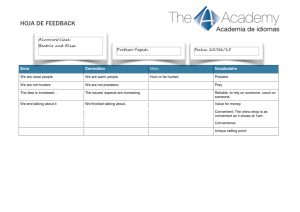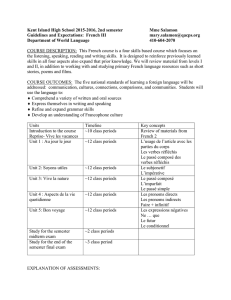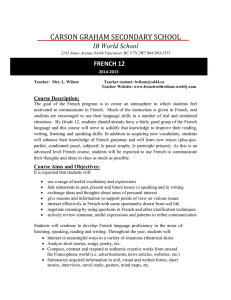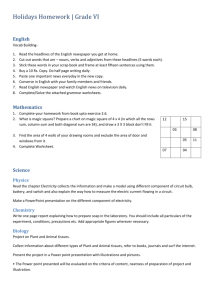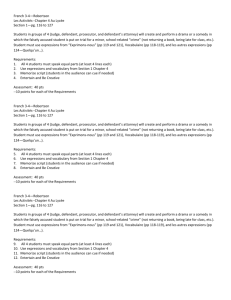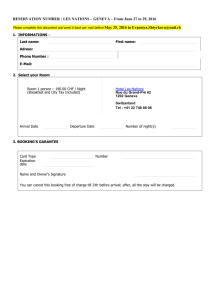AP French Language and Culture Course Syllabus
advertisement
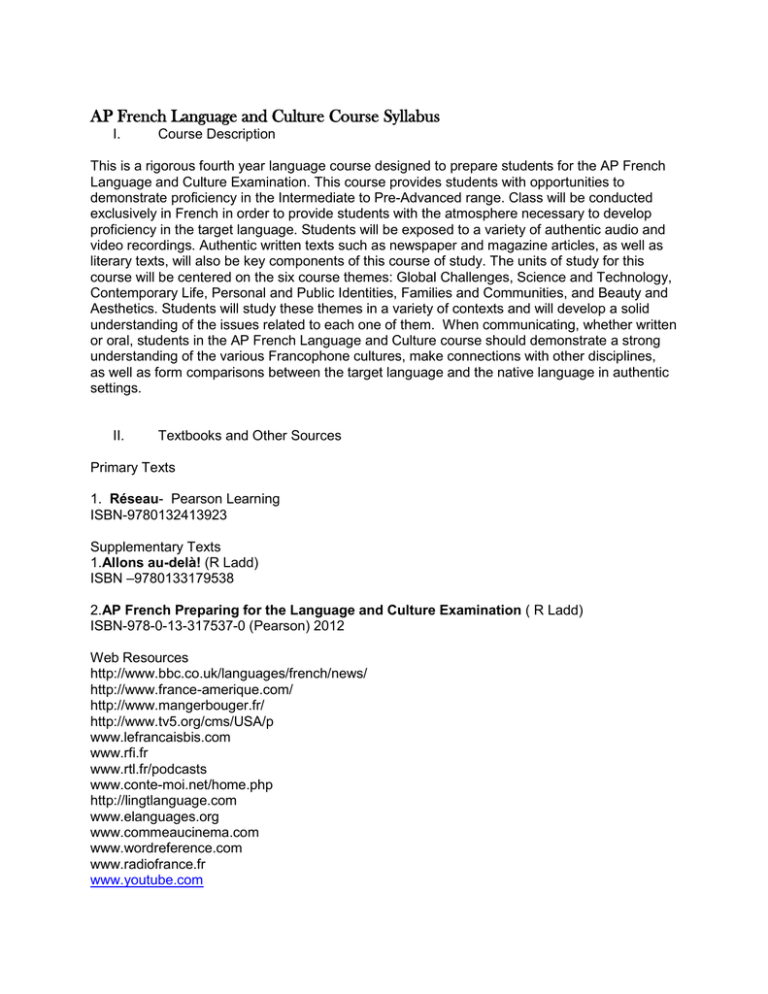
AP French Language and Culture Course Syllabus I. Course Description This is a rigorous fourth year language course designed to prepare students for the AP French Language and Culture Examination. This course provides students with opportunities to demonstrate proficiency in the Intermediate to Pre-Advanced range. Class will be conducted exclusively in French in order to provide students with the atmosphere necessary to develop proficiency in the target language. Students will be exposed to a variety of authentic audio and video recordings. Authentic written texts such as newspaper and magazine articles, as well as literary texts, will also be key components of this course of study. The units of study for this course will be centered on the six course themes: Global Challenges, Science and Technology, Contemporary Life, Personal and Public Identities, Families and Communities, and Beauty and Aesthetics. Students will study these themes in a variety of contexts and will develop a solid understanding of the issues related to each one of them. When communicating, whether written or oral, students in the AP French Language and Culture course should demonstrate a strong understanding of the various Francophone cultures, make connections with other disciplines, as well as form comparisons between the target language and the native language in authentic settings. II. Textbooks and Other Sources Primary Texts 1. Réseau- Pearson Learning ISBN-9780132413923 Supplementary Texts 1.Allons au-delà! (R Ladd) ISBN –9780133179538 2.AP French Preparing for the Language and Culture Examination ( R Ladd) ISBN-978-0-13-317537-0 (Pearson) 2012 Web Resources http://www.bbc.co.uk/languages/french/news/ http://www.france-amerique.com/ http://www.mangerbouger.fr/ http://www.tv5.org/cms/USA/p www.lefrancaisbis.com www.rfi.fr www.rtl.fr/podcasts www.conte-moi.net/home.php http://lingtlanguage.com www.elanguages.org www.commeaucinema.com www.wordreference.com www.radiofrance.fr www.youtube.com AP French Language and Culture Units Unité # 1 La Famille et la Communauté Vocabulaire 1-Les Rapports Sociaux (Age and Class), L’enfance et l’adolescence Vocabulaire 2- Les Coutumes, La Famille, L’Amitié et l’Amour Essential Questions: 1) W hat constitutes a family in different societies? 2) How do individuals contribute to the well-being of communities? 3) How do the roles that families and communities assume differ in the societies around the world? Grammaire : 1) L’impératif et On 2) Les expressions temporelles : depuis, depuis que, il y a…. que, etc. 3) Passe Compose v. Imparfait Unité #2 La Vie Contemporaine Vocabulaire 1-La Publicité et le Marketing, L’Education et l’Enseignement, Les Fêtes Vocabulaire 2- Le logement, Les Loisirs et le Sport, Le Monde de Travail Vocabulaire 3- Les Rites de Passage, Les Voyages Essential Questions: 1) How do societies and individuals define quality of life? 2) How is contemporary life influenced by cultural products, practices, and perspectives? 3) What are the challenges of contemporary life? Grammaire: 1) Futur simple et Conditionnel 2) Les Adjectifs et les Adverbes Comparatif et le Superlatif 4) Transition words Unité #3 3) Le Les Défis Mondiaux Vocabulaire 1- La Tolérance, L’Economie Vocabulaire 2- La Santé, Les Droits de l’Etre Humain, L’Environnement Vocabulaire 3- L’Alimentation, La Paix et la Guerre Essential Questions: 1) What environmental, political, and social issues propose challenges to societies throughout the world? 2) What a re the origins of those issues? 3) What are the possible solutions to those problems? Grammaire: 1) La Négation 2) Adjectifs et Pronoms Possessifs 3) Pronoms Relatifs Unité #4 La Quête de Soi Vocabulaire 1- L’Aliénation et L’Assimilation, Les Croyances et les Systèmes de Valeur Vocabulaire 2- Identité biologique, Identité linguistique Vocabulaire 3- Le pluriculturalisme, le nationalisme et patriotisme Essential Questions: 1) How are aspects of identity expressed in various situations? 2) How do language and culture influence identity? 3) How does one’s identity develop over time? Grammaire: Le Subjonctif- présent et passé Unité #5 La Science et La Technologie Vocabulaire 1- La Recherche et ses Nouvelles Frontières, Les Découvertes et les Inventions Vocabulaire 2- Les Choix Moraux, L’Avenir et la Technologie, La Propriété Intellectuelle Vocabulaire 3- Les Nouveaux Moyens de Communication, La Technologie et ses Effets sur la Société Essential Questions: 1) How do developments in science and technology affect our lives? 2) What factors have driven information innovation and discovery in the fields of science and technology? 3) What role do ethics play in scientific advancement? Grammaire : 1) Les Pronoms y et en 2) La place des pronoms compléments Présent, Gérondifs, le participe passé et présent Unité #6 3) Participe L’Esthétique Vocabulaire 1- L’Architecture, Le Patrimoine, Le Beauté Vocabulaire 2- Les Arts Littéraire, La Musique Vocabulaire 3- Les Arts de Spectacle, Les Arts Visuelles Essential Questions: 1) How are perceptions of beauty and creativity established? 2) How do ideals of beauty and aesthetics influence everyday life? 3) How do the arts both challenge and reflect cultural perspectives? Grammaire:1) Futur Antérieur, Conditionnel Passé, et Plus que parfait Unité #7 Préparation pour L’Examen Practice Tests and Feedback 2) Faire expressions Assessments The purpose of this course is to help students develop their skills in the French language. The goal is to have students move from the novice levels of communication into the intermediate levels of communication as outlined by ACTFL. This is a foundational course that will help the students develop the skills to become fluent in the language. Students will be assessed formally and informally. Informal assessments will be given every day in class. Formal assessments will be in the form of quizzes and tests. Students will have some kind of formal assessment every week of class. The majority of each student’s grade will be based on performance assessments (TESTS). Students will be expected to demonstrate their ability to communicate in interpersonal, presentational, and interpretive situations. Homework/Classwork Students will staple and turn in all completed homework and classwork at the end of every week. This will include board work that students complete daily. This will be turned into the basket by the teacher’s desk. Makeup work/Late Work Students have three days according to CCSD regulations to turn in work after an absence. All assignments are turned in on Friday. If you were absent that week you have until the following week to turn it in. Please turn it in separately from your current week’s homework and mark it as MAKE UP WORK. This helps with correct identification. All assignments are due on Friday, so I do not accept late work from students who were in class but chose not to complete the assignments on time. Extra Credit- THERE IS NO EXTRA CREDIT GIVEN IN THIS CLASS, SO PLEASE DO NOT ASK. Grading System Students will be given grades based on a five point rubric. These points represent the different levels of performance in the three modes of communication. These points are represented by the following grades. Score Points in Grade book Letter Grade 5 8 pts A 4 7 pts B 3 6 pts C 2 5 pts D 1 4 pts F 0 0 pts F – for not taking the assessment after being given ample opportunity to take it. Quarter and Semester Grades Quarter and Semester Grades are based mainly on student performance in the three modes of communication. Homework/Classwork and Quizzes are designed to help the students practice the skills and assess what needs to be done to prepare for the major assessments. These major assessments are worth 90 % of the student’s grade. Students must study, learn, and practice the language in order to get a good grade in the class. Students cannot make up for bad grades by doing extra credit or through making up homework assignments. Students must perform on the assessments in order to get a good grade. Except for semester exams, students will be given the opportunity to retake major assessments. These opportunities will take place on their own time after school or before school. If students do not take advantage of these opportunities, the original grade on the assessment will stand. All grade information can be accessed through the Parentlink system which helps parents and students monitor student progress. Parentlink can be accessed both through the school or district website. Use this tool to your advantage. Quarter Grade Breakdown Classwork/Homework 5% Quizzes 5% Assessments Speaking (Conversational and Presentational) 30 % Interpretive (Reading and Listening Comprehension) 30 % Presentational (Formal and Informal Writing) 30 % 100 % Semester Grade Breakdown First or Third Quarter Grade 40 % Second or Fourth Quarter Grade 40 % Semester/Final Exam 20 % 100 % Class Participation- The Key to Success Active participation in this class is essential to success in this course. Classroom activities are designed to help students learn and grasp material. These lessons are active and require the participation of every student. The student will be required to speak French in class and will have to speak in front of others. Failure to participate in these types of exercises will result in the student failing the class. Students are also expected to come to class prepared with a notebook and writing utensil. They are expected to take notes and complete all assignments given in class, as well as those given for homework. Citizenship Grade The citizenship will be determined by the overall classroom behavior of the student. Classroom participation also plays a role in this grade. Things that can negatively affect a citizenship grade are tardies, foul and inappropriate language, and lack of participation. If a student receives a referral within a quarter, he or she will receive a “U” in citizenship. Classroom Rules and Procedures 1. Respect your fellow classmates, your teacher, and the contents of the classroom at all times. 2. Come prepared to learn by bringing your notebook, pen/pencil, and textbook if necessary. 3. Food and gum interfere with communication. Please leave these items in your backpack or locker. 4. Speak up. Ask questions. Ask for clarification the minute you are confused. 5. Communication is the focus of this class, but not on cell phones. Make sure that cell phones are turned off and put away while in class. Failure to abide by classroom rules and procedures will result in the use of progressive discipline. Progressive Discipline Procedures 1. 2. 3. 4. 5. Verbal Warning Verbal Warning Parent Contact Detention Referral to Administrator Academic Dishonesty Policy Cheating What is it? 1) Giving or receiving information on assessments 2) Using any type of unapproved aide during formal or informal assessments (electronic devices, cheat sheets, etc.) 3) Copying software 4) 5) 6) 7) 8) Copying information from another student’s tests, quizzes, homework, and projects. Discussing content material with students who have not yet taken an assessment. Parental help beyond that of assistance. Talking during an assessment Plagiarism: Copying the essential character of another’s work, whether visual or written, and submitting it as your own. Students that are caught cheating are immediately subject to a zero on the assessment or the assignment on which they cheated. They are also subject to further disciplinary action if the behavior continues which could lead up to a disciplinary referral. Work hard and do well. Do not cheat!!!!!!!!!!!!!!!! Tardy policy Tardies are an unnecessary distraction to the classroom. If students show up late to class three times within a quarter they will be subject to an “N” on their citizenship grade. If the student continues to be tardy they will be subject to a disciplinary referral after the fifth and a “U” in citizenship. Please read through this course expectations and discuss this information with your student. When you have completed this task please fill out this form and have your student return this form to the instructor. Thank you Course: (Circle one) FRENCH I Period: (Circle one) 1 FRENCH II H 2 3 FRENCH III H 4 5 AP French Language and Culture 6 7 Student Last Name: ____________________________________________________ Student First Name: __________________________________________________ Parent or Guardian Full Name: _______________________________________________ Phone Number where parent can be reached: ______________________________________ Best time to contact: _________________________________________________________ Email address: ________________________________________________________ This signature signifies that I have read the course expectations and understand its contents. Student Signature: __________________________________ Date: ___________________ Parent/Guardian Signature ___________________________________ Date: ____________________
